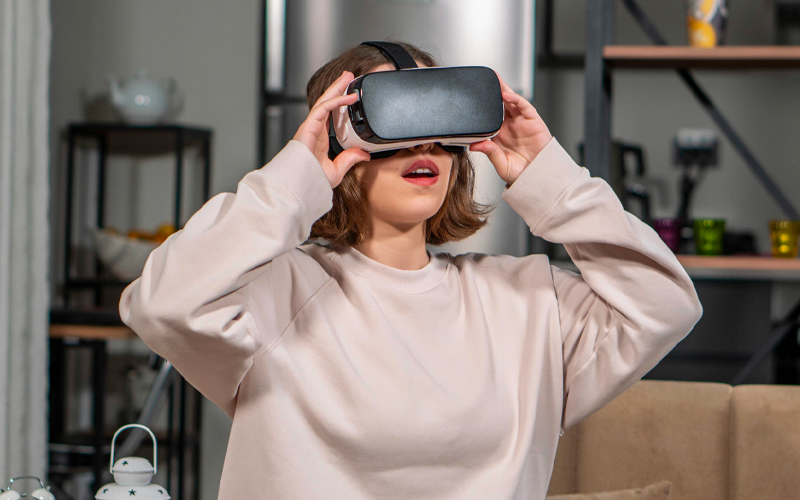A surge of innovative technologies – that redefine how we interact with and experience the world – is continually reshaping the way we travel. Virtual Reality (VR) and Augmented Reality (AR) are among the most transformative innovations. These tools are no longer just novelties; they are reshaping the tourism industry by offering immersive, accessible, and personalised experiences.
The VR in tourism market is set to grow from $7.53 billion in 2025 to $27.5 billion by 2029 at a CAGR of 38.2%. Meanwhile, experts estimate the augmented reality in tourism market will grow even faster, increasing from $29.58 billion to $109.13 billion, at a rate of 38.6% over the same period, at a rate of 38.6%. This growth marks a significant shift in how we imagine, promote, and experience travel in today’s digital-first world.
Virtual and augmented reality in tourism
VR enables fully immersive, simulated environments that allow users to explore destinations virtually. On the other hand, AR overlays digital elements in real-world surroundings, enriching travel experiences without removing users from their environment. Together, these technologies are changing how people discover, plan, and enjoy travel.
They add tangible value by increasing engagement, improving accessibility, and influencing travel decisions. From virtually exploring a city before booking to navigating cultural landmarks in real time, the benefits of VR travel experiences are vast. Technologies like marker-based AR, location-based applications, and Simultaneous Localisation and Mapping software (SLAM) make it possible to blend the physical world with digital elements to enable smarter, more intuitive travel experiences.
Use cases of augmented and virtual reality in the travel industry
Augmented and virtual reality in the travel industry are transforming how people approach tourism – before, during, and even in place of physical travel. The industry is leveraging these technologies in a wide range of use cases, including:
Discovering destinations from home
VR travel experiences let travellers explore destinations virtually either before booking the trip or as a virtual tourism experience. Whether walking through the streets of Rome or exploring the iconic streets of Kyoto, users can get a true sense of the surroundings. This increases confidence and excitement while reducing the uncertainty often associated with planning.
Touring hotels and accommodations virtually
Travellers can now step inside hotels, resorts, and rentals using virtual hotel tours. This transparency helps build trust and empowers users to make informed decisions based on the layout, ambience, and amenities the hotel offers. This sets realistic expectations and enhances satisfaction.
Promoting destinations through immersive marketing
Tourism boards and travel companies are embracing virtual reality in travel marketing by launching immersive campaigns. From virtual travel expos to personalised destination previews, virtual and augmented reality tools in tourism are making promotional content more engaging, interactive, and persuasive.
Training travel staff using simulations
Hotels, airlines, and tour operators are leveraging VR in tourism to train staff in customer service, safety protocols, and emergency response. These simulations create realistic scenarios without the risks and costs of real-world training environments.
Enriching on-ground experiences with AR
Once at the destination, augmented reality in tourism can help guide tourists through cities, museums, and attractions with rich layers of historical context and interactive content. Whether through AR-powered city guides, gamified museum tours, or AR-enabled shopping experiences, travellers can enjoy deeper, more meaningful engagement.
Improving accessibility and inclusivity
AR and VR in tourism make travel more inclusive, especially for people with physical limitations. Virtual tours allow them to experience iconic landmarks without the challenges of navigating physical terrain. On the other hand, AR-powered tools can help eliminate language barriers when exploring cultural treasures.
Promoting sustainable travel alternatives
As the industry confronts the challenges of over-tourism and the increasing carbon footprint of tourism, VR travel experiences offer eco-friendly alternatives. Virtual eco-tours not only reduce carbon footprints but also raise awareness about sustainability while still delivering a sense of adventure.
As the tourism sector embraced digital transformation, Infosys BPM offers tailored solutions to help leverage advanced technologies and integrate VR into tourism strategies. With deep expertise in customer experience, process optimisation, and digital innovation, Infosys BPM supports travel businesses in deploying immersive solutions that drive value and engagement.
Future of AR and VR in tourism
As these immersive technologies continue to evolve, their role in the tourism industry is set to deliver even more dynamic and personalised experiences. Innovations that bridge digital experiences with physical travel will define the future of AR and VR in tourism, and key trends include:[3]
- Fully immersive VR destinations where travellers can explore lifelike simulations of cities, resorts, and natural wonders.
- Real-time, location-aware AR applications that enhance on-site experiences with smart interactive guides, personalised recommendations, and multilingual support.
- Hybrid journeys – blending physical and virtual travel – will combine AR-enhanced navigation and live local experiences for seamless and enriched travel.
These advancements will create more engaging, accessible, and sustainable ways to explore the world, redefining what it means to travel.
Conclusion
AR and VR in tourism are no longer futuristic concepts; they are reshaping the tourism experience in profound ways. From travel inspiration and planning to on-ground navigation and accessibility, virtual reality in travel is adding value for both travellers and providers. As demand grows for immersive and sustainable experiences, VR travel experiences are redefining the tourism industry.




